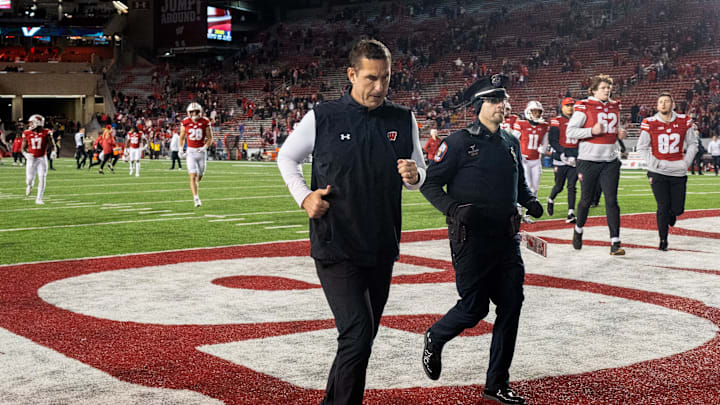The ReliaQuest Bowl painted a bittersweet picture for Wisconsin Football. As LSU celebrated their 35-31 victory, Luke Fickell and the Badgers retreated to the locker room, mulling its missed opportunities and having no choice but to live with a season's worth of unrealized expectations.
"There's definitely lots of things we can build upon," Luke Fickell told reporters. "Ultimately, it comes down to finding ways to finish."
The anticipation at the start of the season, bubbling with optimism, met its conclusion with a 7-6 record, mirroring the previous year under Paul Chryst and Jim Leonhard's leadership. Though the team might be better positioned for the future, the season's performance reveals that success isn't a given and illustrates just how far this staff has to go.
In Wisconsin's six defeats this past season, the Badgers were outscored 32-7 in the fourth quarter, with the only touchdown scored coming against Northwestern in the closing seconds of a game well out of reach.
"We know darn well last year we didn't finish well," Fickell said. "This year, we didn't finish well. We didn't start well. There's a lot of things. It gives us a hell of a lot of things that we've got to start work on here on Jan. 14 when our guys get back."
Simply put, the first season of the Fickell era didn't measure up to its aspirations despite having a relatively favorable schedule that will no longer be the norm in the Big Ten moving forward. A win against a subpar Minnesota program in the regular-season finale, or perhaps even Rutgers, wasn't the marquee victory many expected from the Badgers.
Wisconsin football hopes this season helped lay a foundation for the future, but the Badgers must improve quickly
Hopefully, this Wisconsin football season will serve as the precursor, a disappointing journey that helped shape a budding culture and offered valuable lessons that enable this program to move forward.
But a quick look ahead shows why that could be a daunting task. Next season will require the Badgers to take a considerable leap to compete against its gauntlet of a schedule.
The pressure to elevate their play is pronounced when you consider Alabama's nonconference visit to Camp Randall, a challenging Big Ten lineup, including Penn State, Oregon, and Minnesota at home, plus road games against USC, Rutgers, Northwestern, Iowa, and Nebraska.
Even a markedly better on-field product might struggle to keep the Wisconsin football program's 22-year bowl eligibility streak alive. That's not to say I don't believe in this coaching staff because I do.
But there's no denying the substantial work needed to shape a championship-contending roster in Madison.
Despite signing a promising 2024 recruiting class, the Wisconsin Badgers must consistently begin stacking top 25 classes while pairing them with impact players from the transfer portal to pull this program out of its decline.
Remember, Wisconsin football is just 27-19 since the 2020 season.
The Badgers still have plenty of schematic issues to iron out
Many people, myself included, thought the Wisconsin football team's philosophy shift to the air raid system under first-year offensive coordinator Phil Longo would lead to immediate results, which couldn't have been further from the truth.
The bowl game provided us a glimpse of what we all thought was possible, racking up 506 yards and moving the ball at will through the air. But one game doesn't make up for the fact the Badgers finished the year averaging 23.5 points per game, their lowest mark since 2004.
UW finished No. 7 in Big Ten scoring offense and improved its total yards per game output by just 17 yards (380.5 YPG). I didn't have that on my bingo card before the season. But it's another area that must improve leaps and bounds next fall, or things could get ugly.
Tyler Van Dyke was brought in from Miami via the transfer portal as the logical replacement at starting quarterback. But the Badgers also lost Braelon Allen to the NFL Draft and will need the combination of Chez Mellusi, Tawee Walker, and the trio of incoming freshmen to fill that void.
Then, there's the matter of fixing the Wisconsin football team's defense.
Mike Tressel's unit looked like a group recruited to play a different system because, well, they were. Revamping the Badgers' defense is at the top of their to-do list, as the new regime strives to bring in athletes who match their vision and can withstand the rigors of the Big Ten.
In the first season of running Tressel's 3-3-5 nickel base defense, Wisconsin finished No. 38 in total defense, allowing 344.0 yards per game, No. 39 in rushing defense (135.1 YPG), No. 39 in passing defense (208.9 YPG), and No. 20 in scoring defense, surrendering 20.15 PPG.
By the Wisconsin Badgers standards, that's not good enough. But they'll tell you that. Hopefully, the revamped pass rush and linebacking pieces they've added through the transfer portal will change the entire dynamic of this group. This defense lacked playmakers, and I'd argue that only Hunter Wohler and Ricardo Hallman were difference-makers.
We'll see what next season brings, but there's no reason to feel strongly that either side of the ball is a sure bet to become something the Wisconsin football program can hang its hat on in 2024.
Though the first season of the Luke Fickell era may have been a flop in the present, there's plenty of reason to believe brighter days ahead.
For ongoing coverage of Wisconsin Badgers news, notes, opinions, and analysis, you can follow Dillon Graff on X @DillonGraff.
